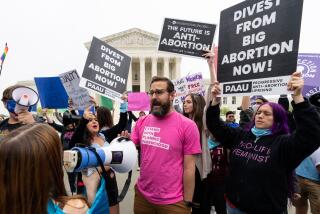Justices suggest Medicaid expansion is unconstitutional
- Share via
Reporting from Washington — The Supreme Court’s conservative justices took aim Wednesday afternoon at a final key piece of President Obama’s healthcare law, suggesting it was unconstitutional to require states to expand their Medicaid programs to cover more poor Americans.
The states have “no realistic choice,” said Justice Anthony Kennedy, effectively accepting the argument by 26 states challenging the law that they are being unjustly forced to administer a massive Medicaid expansion.
Chief Justice John G. Roberts Jr. and Justices Antonin Scalia and Samuel A. Alito Jr. echoed Kennedy’s concerns, signaling their willingness to invalidate yet another part of the healthcare overhaul Obama signed two years ago.
“It is significant authority we are giving the federal government,” cautioned Roberts, whose court now appears poised to strike down a major piece of domestic legislation for the first time since the Great Depression.
Earlier Wednesday, the four conservative justices showed substantial interest in throwing out the entire law.
Justice Clarence Thomas, the fifth member of the court’s conservative wing, did not ask any questions but is widely seen as eager to invalidate the Patient Protection and Affordable Care Act.
Wednesday, Solicitor General Donald Verrilli tried to convince the justices that the law’s provision providing hundreds of billions of dollars to states to expand their Medicaid programs in 2014 was not “coercive.”
Under the act, the federal government will pay more than 90% of the cost of expanding Medicaid to cover all poor Americans, while each state will retain responsibility for administering its own program, as has been the case since Medicaid was created in 1965.
That is a “big gift,” said Justice Elana Kagan, who was joined by the three other liberal members of the court in defending the Medicaid expansion.
But the conservative justices appeared far more convinced by Paul Clement, the attorney for the states. He has argued that the aid undermines state authority by leaving states effectively no choice but to expand Medicaid or face the possibility that the secretary of Health and Human Services would cut off all their aid.
“The concern is that the secretary has total and complete say,” Roberts said, brushing aside Verrilli’s efforts to assure the court that no administration would actually take such a step.
The tough questions about the Medicaid expansion paralleled the conservative justices’ open skepticism about the insurance mandate on the law.
And they reinforced the impression that Kennedy, Alito, Roberts and Scalia have given over the three days of arguments that they believe the law is fundamentally flawed.
“One way or another, Congress will have to revisit it in toto,” Scalia pronounced Wednesday morning.
Agreeing, Kennedy said it would be an “extreme proposition” to allow the various insurance regulations to stand after the mandate was struck down.
The court’s four liberal justices argued repeatedly for restraint, urging deference to Congress.
Justice Ruth Bader Ginsburg said the court should do a “salvage job,” not undertake a “wrecking operation.” But she looked to be out-voted.
Roberts and Alito seemed to indicate they shared the view of Scalia and Kennedy that the law should stand or fall in total.
An Obama administration lawyer, urging caution, said it would be “extraordinary” for the court to throw out the entire law. About 2.5 million young people under age 26 are on their parent’s insurance now because of the new law. If it were struck down entirely, “2.5 million of them would be thrown off the insurance rolls,” said Deputy Solicitor General Edwin Kneedler.
The administration was prepared to accept a ruling that some of the insurance reforms should fall if the mandate were struck down. For example, insurers would not be required to sell coverage to persons with preexisting conditions. But Kneedler said the court should go no further.
But the court’s conservatives said the law was passed as a package, and must fall as a package.
Original source: Justices suggest Medicaid expansion is unconstitutional
More to Read
Sign up for Essential California
The most important California stories and recommendations in your inbox every morning.
You may occasionally receive promotional content from the Los Angeles Times.















